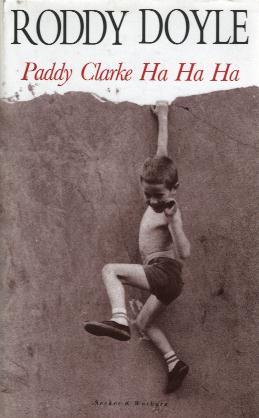
Roddy Doyle
The following novels constitute the shortlist for the 1993 Booker Prize:
Notable Omissions from the 1993 Shortlist

|
Paddy Clarke Ha Ha Ha Roddy Doyle |
Dustjacket synopsis:
"It is 1968. Patrick Clarke is ten. He loves George Best, Geronimo and the smell of his hot
water bottle. He hates zoos, kissing and the boys from the Corporation houses. He can't stand
his little brother. He wants to be a missionary like Father Damien. He coerces the McCarthy
twins and Willy Hancock into playing lepers. He never picks the scabs off his knees before
they're ready.
"Kevin is his best friend. Their names are all over Barrytown, written with sticks in wet cement. They play football, knick-knack, jumping to the bottom of the sea. Shoplifting. Robbing Football Monthly means four million years in purgatory. But a good confession before you died and you'd go straight to heaven.
"He wants to know why no one jumped in for him when Charles Leavy had been going to kill him. He wants to stop his da arguing with his ma. He's confused: he sees everything but he understands less and less.
"Witty and poignant, earthy and exuberant, Paddy Clark Ha Ha Ha charts the triumphs, indignities and bewilderment of Patrick Clarke and his world, a place full of warmth, cruelty, love and slaps across the face."
First Paragraph:
We were coming down our road. Kevin stopped at a gate and bashed it with his stick. It was Missis Quigley's gate; she was always looking out the window but she never did anything.
-Quigley!
-Quigley!
-Quigley! Quigley! Quigley!
Liam and Aidan turned down their cul-de-sac. We said nothing. Liam and Aidan had a dead mother. Missis O'Connell was her name.
-It'd be brilliant, wouldn't it? I said -Yeah, said Kevin. -Cool.
We start talking about having a dead ma. Sinbad, my little brother, started crying. Liam was in my class at school. He dirtied his trousers one day - the smell of it rushed at us like the blast of heat when an oven door was opened - and the master did nothing. He didn't shout or slam his desk with his leather or anything. He told us to fold our arms and go asleep and when we did he carried Liam out of the class. He didn't come back for ages and Liam didn't come back at all.
From the Seeker & Warburg hardback edition, 1993.
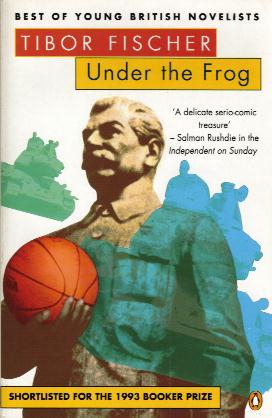
|
Under the Frog Tibor Fischer |
Dustjacket synopsis:
"This is Hungary towards the end of the war and before the 1956 revolution. Or to put it another
way, 'under a frog's arse down a coalmine' - the Hungarian expression for when you are truly at
the lowest point of life."
Quotes:
"A delicate serio-comic treasure" - Salman Rushdie, Independent on Sunday
"I began Under the Frog on a crowded double decker in a London traffic jam ... and soon
found myself laughing like an idiot ... It is a triumph ... painfully moving, it is also
uproariously funny" - Noah Richler, Guardian
"A quite wonderful book ... He takes a serious subject, Hungary from 1944 to 1956, and is
seriously funny about it ... The result is plausible, insolent, sophisticated and hungry ...
Glorious!" - Michael Hofmann, The Times
"A remarkable first novel" - David Holloway, Daily Telegraph
"Funny, slangy, tragic, impeccably researched romp in the company of Gyrui and his pals of the
Locomotive basketball team ... a richly convincing line-up of skivers, copulators, opportunists
and, above all, survivors in the face of oppression" - Peter Reading, Independent on Sunday
"Original and impressive first novel ... sharp, funny and moving" - Ian McIntyre, Independent
Books of the Year
"Truly funny ... truth and imagination work together in a first novel to be treasured" -
Frederic Raphael, Spectator
First Paragraph:
It was true that at the age of twenty-five he had never left the country, that he had never got more than three days' march from his birthplace, no more than a day and a half of horse and carting or one long afternoon's locomoting. On the other hand, Gyuri mused, how many people could say they had travelled the length and breadth of Hungary naked?
They always travelled naked. He couldn't remember how or why this started, but it had become the irrefrangible rule for the Locomotive team as they traversed the nation for their matches. They always travelled in their luxury wagon (custom-built by Hungarian railways for the Waffen SS to facilitate them in their Europe-wide art-looting, and well known to the authorities on rolling-stock as a peerless carriage for riding the rails) and they always travelled naked.
From the Penguin paperback edition, 1993.

|
Scar Tissue Michael Ignatieff |
Dustjacket synopsis:
" At the heart of Scar Tissue is a son's account of his mother's voyage into a world of neurological disease,
losing her memory and then her very identity, only to gain - at the very end - a strange serenity. Obsessed with his
mother's transformation, the son sets out on his own quest for self-discovery."
Quotes:
"No recent British novel has traversed the worlds of reason and emotion, the human presence and its annihilation,
so effectively and directly" - Pat Kane, New Statesman
"Both moving and intellectually challenging...a novel of rare resonance" - David Robson, Sunday Telegraph
"Ignatieff's novel impresses in its wisdom as much as in its restraint...this is a rich novel written by a magnamimous
writer with an exquisite talent for naturalism" - Michael Wright, The Times
First Paragraph:
I do not want to remember her last hour. I do not want to be eternally condemned to think of her as she was in those final moments, when we held her hands, my brother and I, and she fought for life and lost, her mouth stretched open, gasping for breath, her eyes staring sightlessly up into the lights. That scene goes on and on, as if it will never end, as if some unreconciled part of me denies that it actually occurred. I still have days when everything she ever was, everything she ever meant to me is entirely erased by the memory of those great agonising breaths, that frail body wracked with spasms, those lips wet with blood. There must be some way to redeem this, some way to believe that the banal heartlessness of it all was not for nothing. There must be some way back to the unscarred beginnings, when she was in her painting clothes, barefoot, sipping a beer, humming to herself, happy and far away. That is how she should be remembered. That is what I must rescue from her dying, if such a thing can be done.
From the Vintage paperback edition, 1992.
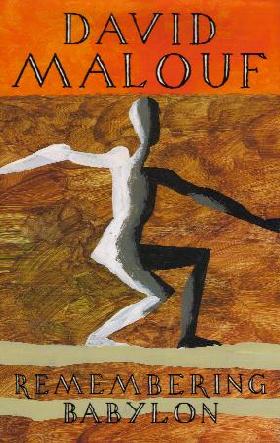
|
Remembering Babylon David Malouf |
Dustjacket synopsis:
"In the mid-1840s, a thirteen-year-old boy, Gemmy Fairley, is cast ashore in the far north of
Australia and taken in by aboriginies. Sixteen years later, when settlers reach the area, he
moves back into the world of Europeans, men and women who are staking out their small patch of
home in an alien place, hopeful and yet terrified of what it might do to them.
"Given shelter by the McIvors, the family of the children who originally made contact with him, Gemmy seems at first to be guaranteed a secure role in the settlement, but there are currents of fear and mistrust in the air. To everyone he meets - from George Abbot, the romantically aspiring young teacher, to Mr Frazer, the minister, whose days are spent with Gemmy recording the local flora; from Janet McIvor, just coming to adulthood and discovering new versions of the world, to the eccentric Governor of Queensland himself - Gemmy stands as a different kind of challenge, as a force which both fascinates and repels. And Gemmy himself finds his own whiteness as unsettling in this new world as the knowledge he brings with him of the savage, the aboriginal.
"A magnificent portrait of a continent and a searing account of the ordeals of settlement and first contact with the unknown, Remembering Babylon has the poetic intensity that marked Malouf's An Imaginary Life. The result is a rich and compelling novel, written in language of astonishing poise and resonance, and immensely powerful in its vision of human differences and eternal divisions."
First Paragraph:
One day in the middle of the nineteenth centrury, when settlement in Queensland had advanced little more than halfway up the coast, three children were playing at the edge of a paddock when they saw something extraordinary. They were two little girls in patched gingham and a boy, their cousin, in short pants and braces, all three barefooted farm children not easily scared.
They had little opportunity for play but had been engaged for the past hour in a game of the boy's devising: the paddock, all clay-packed stones and ant trails, was a forest in Russia - they were hunters on the track of wolves.
From the Chatto & Windus hardback edition, 1993.
Note:
You can find full details about this, and other novels by David Malouf at this
webpage.
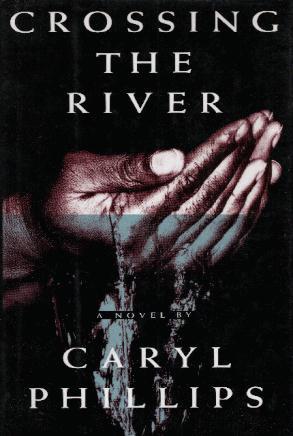
|
Crossing the River Caryl Phillips |
Dustjacket synopsis:
"'A desperate foolishness. The crops failed. I sold my children.'
"So begins Caryl Phillips's superb new novel: a voice speaking out of a distant past describing the consequences of his desperation - his daughter and two sons condemned to the hold of an English slave ship bound for America in 1753. What follow are the stories of these children: Nash, Martha and Travis. Yet as the narrative unfolds, we come to understand that although they are his children, they are also all of slavery's children: Nash, returning to Africa in the 1830s a Christian-educated adult, a missionary to the new territory of Liveria, slowly becoming a part of the world his 'masters' intended him to convert...Martha, her own daughter and husband sold away from her, settling in the American 'wild west' of the late nineteenth century, freeing herself from slavery but never from the weight of 'such misery in one life'...Travis, an American GI stationed in a small Yorkshire village during the Second World War, finding an acceptance in England that he doesn't know at home and that he may not be able to promise his half-English son...
"These brilliantly resonant stories - along with the slave ship captain's journal and lamentations of the children's father - become a 'many-tongued chorus of a common memory' so vivid and powerful that it bridges the gaps between continents and centuries, inextricably linking the many generations of the African diaspora, one to the other.
"Crossing the River - masterfully conceived and crafted, driven by a powerful emotional force - is a bold confirmation of Caryl Phillips's singular gifts."
First Paragraph:
A desparate foolishness. The crops failed. I sold my children. I remember. I led them (two boys and a girl) along weary paths, until we reached the place where the mud flats are populated with crabs and gulls. Returned across the bar with the yawl, and prayed a while in the factory chapel. I watched as they huddled together and stared up at the fort, above which flew a foreign flag. Stood beneath the white-washed walls of the factory, waiting for the yawl to return and carry me back over the bar. In the distance stood the ship into whose keep I would soon condemn them. The man and his company were waiting to once again cross the bar. We watched a while. And then approached. Approached by a quiet fellow. Three children only. I jettisoned them at this point, where the tributary stumbles and swims out in all directions to meet the sea. Bought 2 strong man-boys, and a proud girl. I soiled my hands with cold goods in exchange for their warm flesh. A shameful intercourse. I could feel their eyes upon me. Wondering, why? I turned and journeyed back along the same weary paths. I believe my trade for this voyage has reached its conclusion. And soon after, the chorus of a common memory began to haunt me.
From the Knopf hardback edition, 1994.
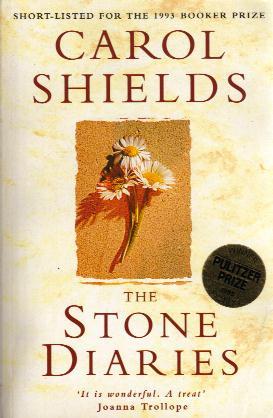
|
The Stone Diaries Carol Shields |
Dustjacket synopsis:
"This is the story of Daisy Goodwill, from her birth on a kitchen floor in Manitoba, Canada, to
her death in a Florida nursing home nearly ninety years later. Her ordinary life is made
extraordinary in the telling."
Quotes:
"It is wonderful. A treat" - Joanna Trollope
"I can think of few novels containing so much that is resonant and unforgettable, or that
invite the reader to particpiate so fully and rewardingly. The Stone Diaries is a
triumphant and important book and deserves a wide audience" - Sunday Telegraph
"Rapturous, sensitive and funny." - Guardian
"The best novel we are likely to see this year." - Independent
"If it does not win the Booker Prize for Fiction it will because it is too good." - Scotland
on Sunday
"A novel of an altogether superior kind." - Anita Bookner
First Paragraph:
My mother's name was Mary Stone Goodwill. She was only thirty years old when she took sick, a boiling hot day, standing there in her back kitchen, making a Malvern pudding for her husband's supper. A cookery book lay open on the table: "Take some slices of stale bread," the recipe said, "and one pint of currants; half a pint of raspberries; four ounces of sugar; some sweet cream if available." Of course she's divided the recipe in half, there being just the two of them, and what with the scarcity of currants, and Cuyler (my father) being a dainty eater. A pick-and-nibble fellow, she calls him, able to take his food or leave it.
From the Fourth Estate paperback edition, 1993.
Notable Omissions from the Shortlist:
"A River Sutra", Gita Mehta
"The Ancestor Game", Alex Miller (winner of the 1993 Miles Franklin Award and 1993 Commonwealth Writers Award)
"My Idea of Fun", Will Self
"A Suitable Boy", Vikram Seth
"Trainspotting", Irvine Welsh
This page and its contents are copyright © 2002-05 by Perry Middlemiss, Melbourne, Victoria, Australia.
Last modified: October 15, 2005.